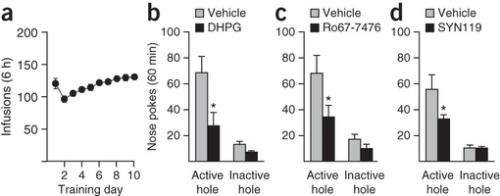November 25, 2013 report
Researchers find glutamate receptor helps suppress cue induced cocaine craving

(Medical Xpress)—A team of researchers with members from several universities in the U.S. has found that a glutamate receptor given to test rats addicted to cocaine caused a reduction in cue induced cravings for the drug. In their paper published in the journal Nature Neuroscience, the team explains how they gave the receptor to addicted rats and then noted how they exhibited signs of reduced cravings due to external cues.
People who have become addicted to cocaine find, like other addicts, that it's not just physical withdrawal symptoms that makes it difficult to quit the drug, it's also environment cues, such as visiting a place where drugs once were purchased or used. Prior research has found that there is a physical cause for such cravings—an increase in the glutamate receptors CP-AMPARs in a part of the brain known as the nucleus accumbens (NAcc). Other research has shown that it might be possible to prevent such an increase by applying other glutamate receptors which result in reduced cued inspired cravings.
In this new effort, the researchers caused several rats to become addicted to cocaine, but as they did so, they also introduced an environmental cue associated with its application—a light bulb turning on when they poked their nose into a box. Next, the rats were put through an abstinence period where they received no cocaine. After enough time passed to allow for the physical signs of withdrawal to abate, the researchers tested the rats' responsiveness to the environmental cue and found the response occurred as expected. That was followed by the application of another glutamate receptor called mGluR1. By observing the behavior of the rats, the researchers were able to note a decrease in the type of behavior typically associated with cravings. The researchers also dissected the brains of the test rats and discovered that the level of CP-AMPARs in the NAcc was lower in the rats that had received mGluR1.
Further analysis by the team revealed that the CP-AMPAR dampening caused by the presence of mGluR1 lasted for approximately 24 hours, suggesting it could prove useful as a tool for combating cocaine addiction. Before that can happen, however, more testing of the receptor will need to be done to find out if it causes other side effects, and then, if it will work the same way in humans.
More information: Synaptic depression via mGluR1 positive allosteric modulation suppresses cue-induced cocaine craving, Nature Neuroscience (2013) DOI: 10.1038/nn.3590
Abstract
Cue-induced cocaine craving is a major cause of relapse in abstinent addicts. In rats, cue-induced craving progressively intensifies (incubates) during withdrawal from extended-access cocaine self-administration. After ~1 month of withdrawal, incubated craving is mediated by Ca2+-permeable AMPA receptors (CP-AMPARs) that accumulate in the nucleus accumbens (NAc). We found that decreased mGluR1 surface expression in the NAc preceded and enabled CP-AMPAR accumulation. Thus, restoring mGluR1 transmission by administering repeated injections of an mGluR1 positive allosteric modulator (PAM) prevented CP-AMPAR accumulation and incubation, whereas blocking mGluR1 transmission at even earlier withdrawal times accelerated CP-AMPAR accumulation. In studies conducted after prolonged withdrawal, when CP-AMPAR levels and cue-induced craving are high, we found that systemic administration of an mGluR1 PAM attenuated the expression of incubated craving by reducing CP-AMPAR transmission in the NAc to control levels. These results suggest a strategy in which recovering addicts could use a systemically active compound to protect against cue-induced relapse.
© 2013 Phys.org














